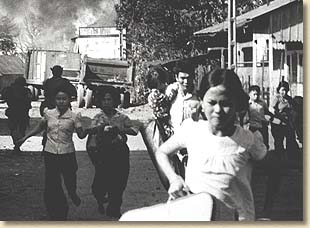 |
||||
|
||||
| The end of the war and the reunification of Vietnam brought about many changes. Between 1975 and 1978, the Communist government attempted to send several million people into what were termed "new economic zones" - areas to be cleared and developed for agricultural use. However, the ravages of war had left much of the land unusable, and the majority of settlers returned, in secret, to the cities.
Supporters of the former regime were invited to enrol in "re-education camps" that had been set up to convince the population of the benefits of Communism. Attendees might stay for a few months or a few years; conditions at the camps varied according to several factors, such as the importance of those held there and the camp's distance from the city. Others who had shown opposition to the new regime (several hundred thousand people) were held in city prisons. Two important events took place in Vietnam in 1979. A conflict between Vietnam and China increased antagonism against the Hoa, or Chinese-Vietnamese, and led to their expulsion from Vietnam soon after. And a conflict between Vietnam and Cambodia led to Western European and non-Communist Asian countries introducing an economic embargo, causing the Vietnamese economy, which was already suffering as a result of poor crops, heavy taxes and the abolition of private business, to worsen considerably. |
||||
 |
 |
|||
|
|
||||
| Menu | At the Museum Discover Vietnam | History of Vietnam | Leaving Vietnam | In Canada More Information | Index | Credits |
||||
|
|
||||
